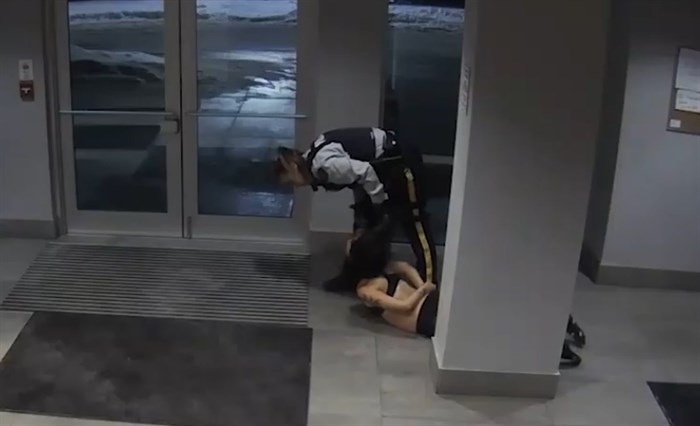
This video of RCMP Const. Lacy Browning's response to a wellness check on UBCO student Mona Wang has triggered discussions on how police and Interior Health handle mental health calls.
Image Credit: YOUTUBE
July 03, 2020 - 6:00 PM
The City of Kelowna’s call on Interior Health to expand a program that uses RCMP and nurses to answer mental health calls may not be a good use of resources, an Interior Health vice-president says.
The program was called Car 40 when it started in Kamloops in 2014 and PACT (Police and Crisis Team) when it was launched in Kelowna in 2017. It pairs an RCMP officer with a registered nurse employed by Interior Health to deal with some mental health calls.
In both cities, the program deals with an average of only four calls per shift whereas Kelowna RCMP deal with roughly 10 calls per day.
“That model isn’t, perhaps, the most effective use of that registered nurse’s time,” Karen Bloemink, vice-president for clinical operations for Interior Health, north, told iNFOnews.ca today, July 3. “It may be more effective to have that registered nurse embedded in a team-based model of service where the care is delivered in a proactive and an upstream way to, hopefully, have the preventative impact that we would like to see over the long term for individuals that have mental health needs.”
Her comments came one day after RCMP Southeast Division Chief Supt. Brad Haugli called on Interior Health to assess all mental health calls for assistance and about a week after Kelowna Mayor Colin Basran said his calls for an expansion to the PACT program were being held up by Interior Health not supplying more staff.
This discussion was fallout from a video that was released in June of UBCO student Mona Wang being dragged handcuffed through a hallway by a Kelowna RCMP officer who had responded to a request for a wellness check.
READ MORE: Kelowna mayor wants more mental health services working with police
“Right at this time, we aren’t committed to an expansion of the program because we need to, first, understand how we best increase access to supports for the population that needs it,” Bloemink said. “We have a responsibility to make sure that we’re putting scarce health resources where they can best impact the population in a positive way.”
That might mean assessing all the supports in the system.
Interior Health has a Community Response Team in every community within its region, which stretches from north of Kamloops to the Alberta and U.S. borders, serving 800,000 people. The RCMP, in roughly the same region, responded to more than 15,000 mental health calls in the region in 2019.
Community Response Teams also respond to some mental health calls. Some of the calls go to the Interior Crisis Line Network (1-888-353-2273) that will direct callers to 911 when necessary but may also divert them to the response team or other agencies. Bloemink didn't have a break down of numbers of calls in either scenario.
READ MORE: Interior RCMP brass call for more mental health workers to help police in light of video
While the PACT team is available only four days a week in Kelowna, the response team is available seven days a week from 11:30 a.m. to 9 p.m. It’s made up of a registered nurse and a social worker who can respond to a police call or offer advice from a distance. They rarely, if ever, attend in person, unlike the PACT team.
Hours and methods of operation vary depending on the community they are based in.
Bloemink was unclear about the difference between the two teams and when either would be called.
She said Interior Health will work with its partners, such as the City of Kelowna and the RCMP, to find ways to improve service to people in mental distress.
“We know crisis response is important and we need to be able to deliver that service in a way that is meaningful and is accessible to the population,” she said. “We also need to be able to provide services that provide longitudinal care for people that may have health needs related to their mental health so they can live healthy on a day-to-day basis. Providing the longitudinal care is one way of, hopefully, reducing the frequency of crisis events.”
Interior Health officials will be meeting with the city next week to discuss the issue. Haugli’s letter was sent to Interior Health on Tuesday so a response and meeting date have not yet happened.
READ MORE: iN VIDEO: RCMP investigating Kelowna officer caught on video dragging nursing student
To contact a reporter for this story, email Rob Munro or call 250-808-0143 or email the editor. You can also submit photos, videos or news tips to the newsroom and be entered to win a monthly prize draw.
We welcome your comments and opinions on our stories but play nice. We won't censor or delete comments unless they contain off-topic statements or links, unnecessary vulgarity, false facts, spam or obviously fake profiles. If you have any concerns about what you see in comments, email the editor in the link above.
News from © iNFOnews, 2020